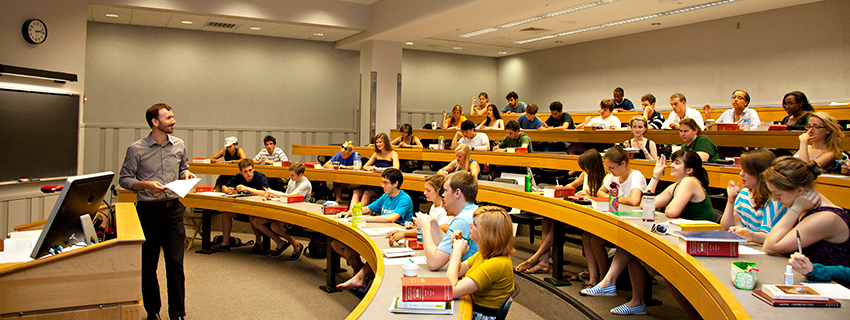
Many students complain about being pestered by political campaigners, especially amidst the upcoming presidential election. Nevertheless, advocacy is quite common on the College campus and has the ability to facilitate important discourse. However, some activists are intrusive and have the tendency to egregiously violate campus solicitation policies.
If you go to Dartmouth, there is a decent chance you’ve seen a young woman named Katie (last name withheld for courtesy) who sports a Green New Deal t-shirt and advocates on behalf of the New Hampshire Youth Movement. With a vague title like that, at first, it is unclear what the group stands for, politically speaking. A quick internet search reveals that, unsurprisingly, it’s a left-wing youth organization that endorses the entire socialist series: Free College For All, Medicare For All, and, of course, the Green New Deal. One of the two flyers she distributes states that:
“When young people vote we can make up the margin of victory for candidates that support our values. In 2016, Senator Maggie Hassan won New Hampshire by just 1,017 votes. With almost 200,000 young people in the state, there are enough of us to easily decide an election. This is our chance to choose the next president—one that represents us and our values.”
I am not sure what encompasses “our values,” given that young people, as with any other age, racial or gender demographic, are by no means a monolith. If anything, the NH Youth Movement partially explains why out-of-state students should not be allowed to influence New Hampshire politics.
At this point, it is clear that I do not subscribe to the far-left politics espoused by the NH Youth Movement. That said, it is well within the organization’s free speech rights to advocate their message on public spaces, such as the Campus Green. What I do have a problem with, however, is when partisan activism enters the classroom setting.
For months, Katie has been entering classes to advocate her organization’s left-wing agenda. The process usually begins as follows. Once class begins, Katie spontaneously arrives, where she asks the professor if she can give a quick presentation. The professor, often reluctant to say no, begrudgingly complies, allowing her to deliver her message.
My first encounter with Katie was when she visited my Geography 18: Urbanization & the Environment class. She proceeded to introduce herself and share the “really great things” her organization advocates for, also known as the leftist laundry list. Then, she asked us to fill out cards, on which we were to indicate political matters important to us from a list of options, as well as provide our contact information. As seen in the card photo, the selection of issues is heavily slanted—of course there is no mention of the economy or immigration enforcement, since such concepts do not exist within the increasingly leftwards-shifting Democratic Party.
Indeed, the NH Youth Movement likely has no intention of ever reading the responses and just wants student contact information—a core tenet of political activism is garnering a distribution list, after all.
During her presentation, Katie did not make much reference to Dartmouth, but told us that she recently graduated college. To many, this gives off the impression that she is an alumna; this is not the case, however. In fact, she just graduated from Bowdoin College last year, and is, indeed, a paid activist stationed here at Dartmouth.


In the top right corner of the organization card, I noticed a yellow logo that seemed familiar. Indeed, such emblem belongs to the Sunrise Movement, a far-left climate alarmist national 501(c)(4) political action organization. You may recognize the group from its publicity stunts, which include occupying Speaker Nancy Pelosi and Senator Dianne Feinstein’s offices. Essentially, these are the people who feel that current Democratic politicians are not left-wing enough.
According to various news sources, the Sunrise Movement has “joined forces” with the NH Youth Movement this election cycle to advocate their shared ideals. In fact, Katie lists the Sunrise Movement, not the NH Youth Movement, as her current employer on LinkedIn. In other words, it is likely the national far-left Sunrise Movement is significantly funding NH Youth Movement, including Katie’s salary. Perhaps this is why she feels that it is acceptable to storm into classrooms—the organization paying her does it all the time with congressional offices.
After campaigning in my geography class, a few weeks later, Katie visited my government class to deliver the same presentation. Last week, The Review was informed that she attended a computer science lecture in the Life Sciences Center, where she spoke to the class about her ordeals with the health care system, having had to switch across numerous medical plans to find flexible coverage. She concluded that only Medicare for All can alleviate these struggles, because that’s exactly what socialized healthcare provides: choice, right?
Political campaigning in the classroom, especially at a school that costs $75,000 a year, is inappropriate. Given that Katie’s activism is clearly partisan, non-College affiliated, does not pertain to course curriculum, takes up expensive learning time, and that she is not a Dartmouth student, The Review contacted the school administration to clarify Dartmouth’s policies pertaining to third party non-College affiliated activism.
To the administration’s credit, they were responsive and promptly scheduled a meeting with us. Eric Ramsey, Dartmouth’s Associate Dean of Student Life, emphatically affirmed that any form of solicitation is strictly prohibited on private Dartmouth College property. This information confirms that Katie and the NH Youth Movement are in violation of campus solicitation policies. According to Ramsey, beyond the classroom, department buildings and even the library are off limits for campaigning. It is only permitted in public spaces, such as the Green, or the semi-public Collis Center. Ramsey informed The Review that he would be reaching out to the NH Youth Movement and Katie to inform them where they are not permitted to campaign.
That said, three days after meeting with the administration, a fellow Reviewer alerted me that Katie was still campaigning and distributing literature outside a classroom. Despite being informed that she does not have the authorization to campaign in a College building, Katie claimed her actions are fine since “she is not selling anything.”
Irrespective of politics, any form of campaigning or solicitation in the classroom is wrong. Classrooms are for learning. Students do not pay $75,000 in annual Dartmouth tuition to be inundated with political advertising during class.
We at The Dartmouth Review will continue to follow this story until action is taken and Katie, the paid activist from the Sunrise/NH Youth Movement, adheres to campus solicitation policies. If no policy exists enforcing political solicitation, we will keep writing until one is made.
Finally, I would like to direct a message to Katie specifically: If you are reading this, please know that much of the sarcasm in this piece is a joke. Move on (but not to the next classroom).
UPDATE: One week after the publication of this piece, the administration confirmed it had reached out to the NH Youth Movement, and their in-class activism subsequently came to a halt.

Stick her with a no trespass order. She has repeatedly violated campus policy and should not, for any reason, be disrupting classroom time. Very entitled behavior.
“Students do not pay $75,000 in annual Dartmouth tuition to be inundated with political advertising during class.”
That horse flew long ago. The only difference here is that it isn’t the teacher doing it.